Explore our infographic library
Science-Based
Practical & Applied
Professionally Designed
Reputable & Trusted
-

RAMADAN NUTRITION TIMELINE
An athlete’s guide for fuelling during Ramadan.
-

PRE-EXERCISE CAFFEINE TIMING
Depending on the form of caffeine, you should adjust when you take it.
-

COMPLETE PROTEIN SOURCES
Amino acid content of animal and plant-based proteins categorises them into complete or incomplete.
-

PHYSIOLOGICAL MODEL OF REDS
Mapping the complexities and significance to athletes, including Low Energy Availability (LEA).
-

ELECTROLYTES
When you sweat you lose water and electrolytes, both are key for hydration.
-

PLANT VS ANIMAL PROTEIN
Both are recommended to include in a healthy diet, but which is best?
-

DEHYDRATION & HEALTH
Maintaining hydration status is key for numerous aspects of health.
-
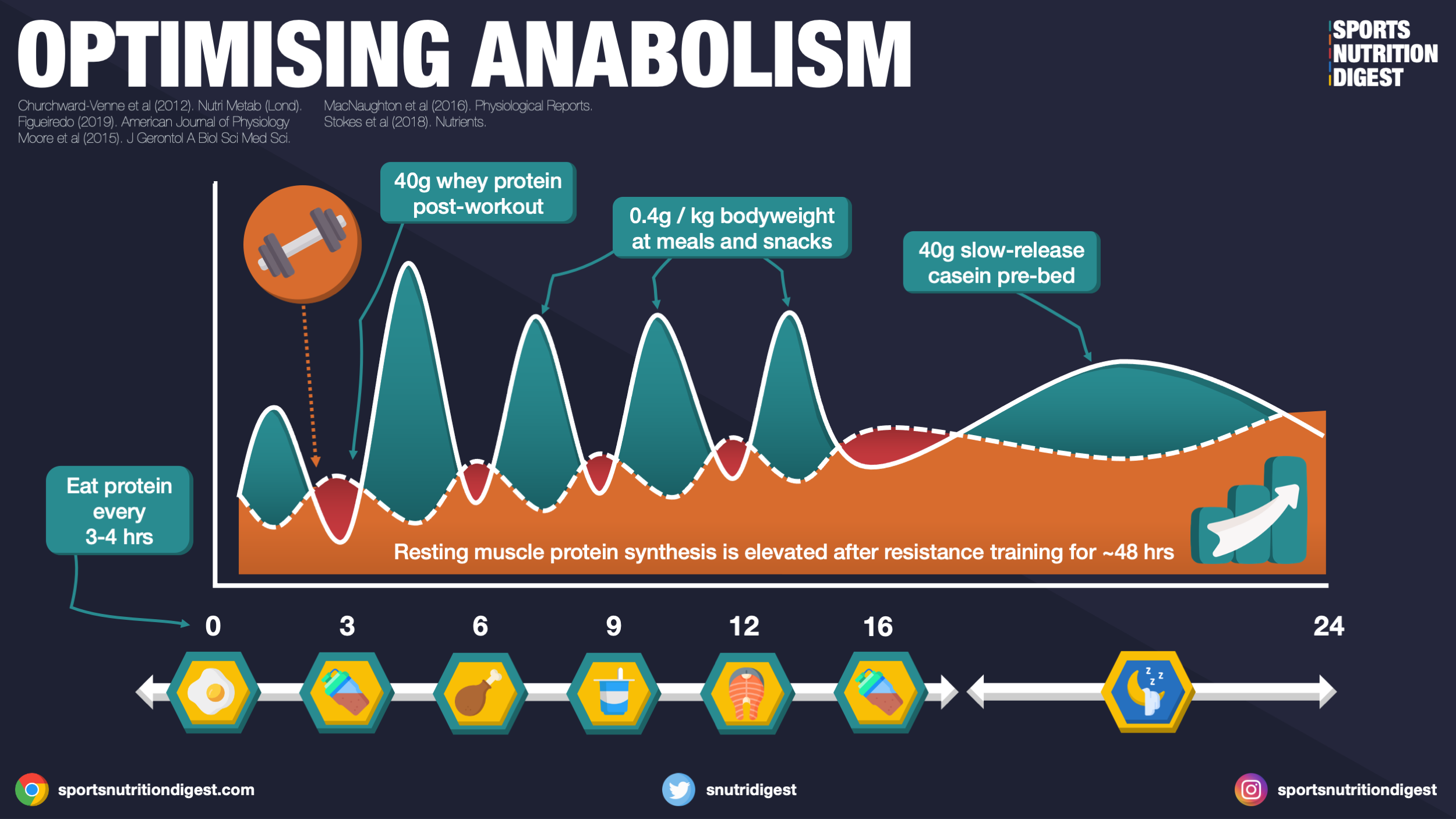
OPTIMISING ANABOLISM
How you can use protein to optimise muscle building and maximise muscular potential.
-

COMPONENTS OF ENERGY EXPENDITURE
How many calories we need depends on these factors.
-

INJURY & ILLNESS IN RUGBY UNION
How many lost opportunities are there in rugby per season.
-

HYDRATION MONITORING TOOL
A tool you can use to assess if you are hydrated or dehydrated.
-

SOURCES OF NUTRITION INFORMATION
What are the common sources of nutrition information.
-

CURRENT DIET TRENDS
There are numerous diets that are proposed as being “optimal”, but you should be skeptical.
-

ENERGY EXPENDITURE IN SPORT
What sports burn the most calories and differences between genders.
-

CONTROL OF ENERGY EXPENDITURE
How different factors affect the number of calories we need daily.
-

CALORIES IN FOOD
How many calories do each macronutrient contain.
-

FOOD GROUPS
The primary 4 food groups that a balanced diet should contain.
-

INJURY & ILLNESS IN AQUATIC SPORTS
Could nutrition improve injury and illness incidence in aquatic sports?
-

PROTEIN SOURCES
Animal and plant-based dietary protein sources.
-

WATER OR SPORTS DRINK
Which is the best option for hydration and to support training and performance goals.
-

FUNCTIONS OF DIETARY PROTEIN
What does dietary protein do in the body and why is it important.
-

PROTEIN TIMING
What are the best times to eat protein to get the benefits for health and performance.
-
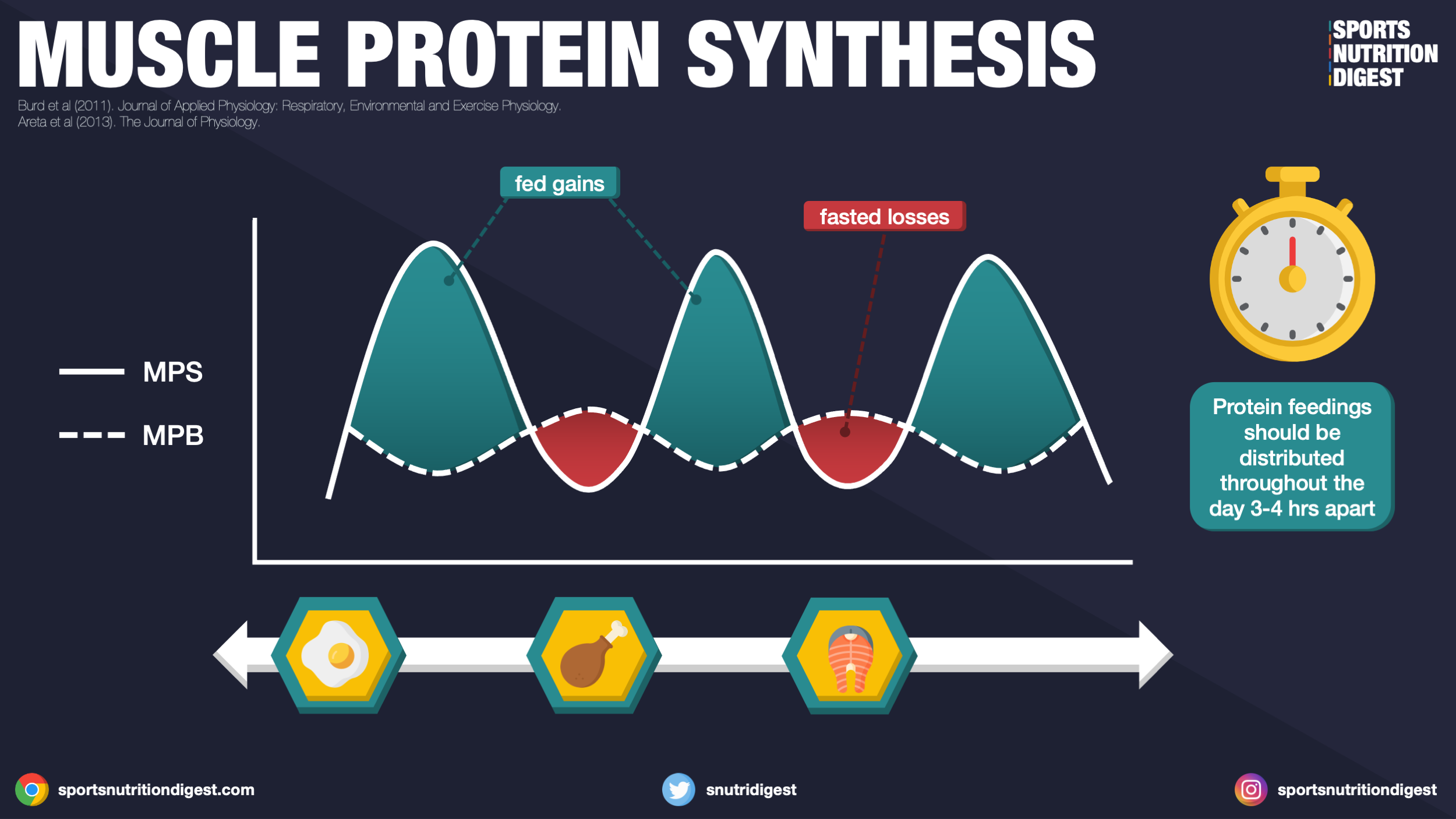
MUSCLE PROTEIN SYNTHESIS
What happens when you ingest protein and how that influences muscle building.
-

CARBOHYDRATE SOURCES
What are the best sources of carbohydrate to include in your diet
-

FUNCTIONS OF CARBOHYDRATE
Why it is important to include carbohydrate in a balanced diet.
-

ATHLETE CARBOHYDRATE NEEDS
Depending on your training, the amount of carbohydrate you need changes.
-

HIGH CARBOHYDRATE DIET
What does a high carbohydrate (800g) diet look like on a plate.
-

CARBOHYDRATE TIMING
When you should consume carbohydrate to optimise performance.
-
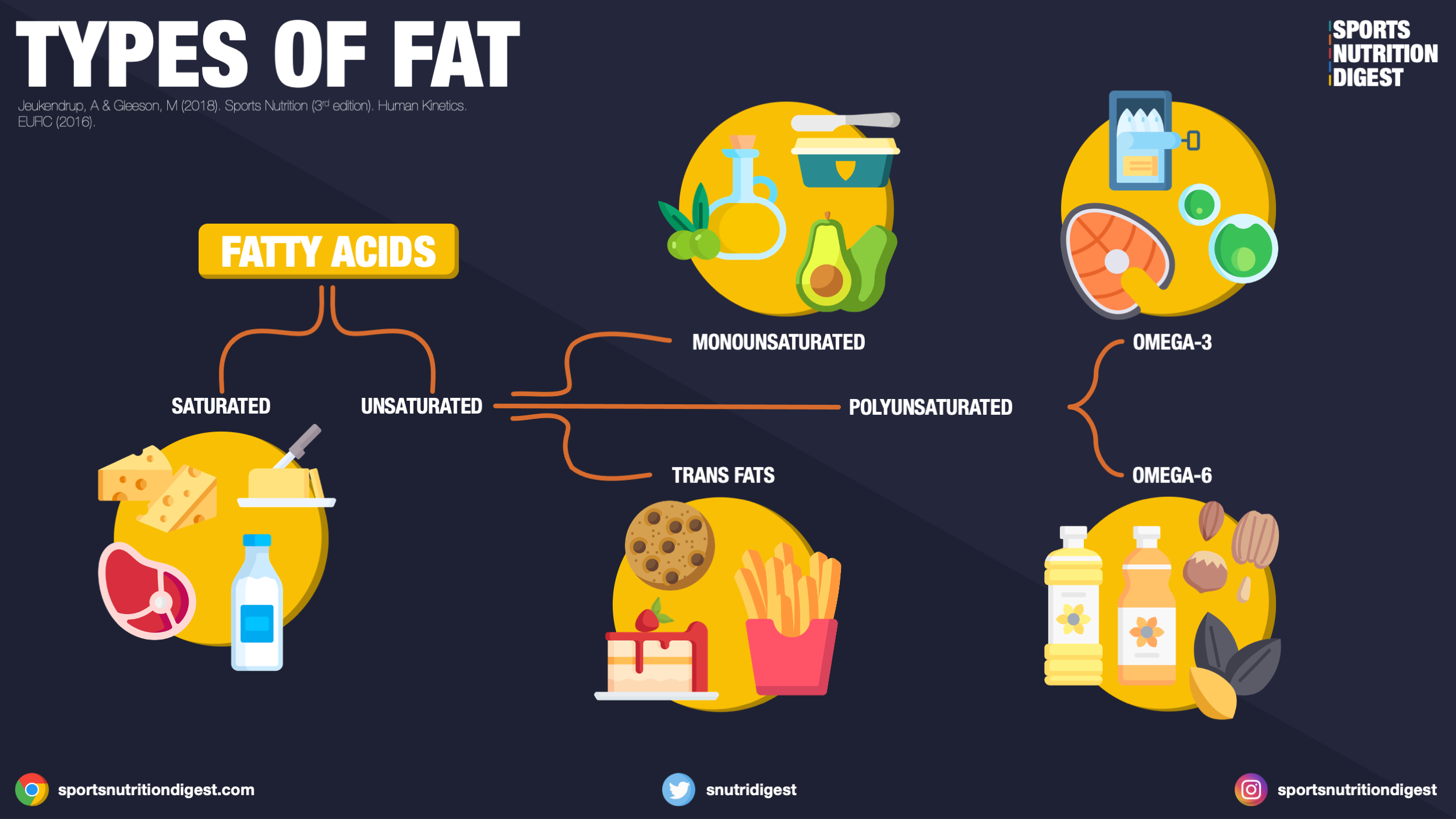
TYPES OF DIETARY FAT
What are the primary types of dietary fat to include in a healthy and balanced diet.
-

DIETARY FAT IN FOOD
Different types of dietary fats and total fat content in common foods.
-

FUNCTIONS OF DIETARY FAT
Dietary fat is often maligned but it plays various important roles in the body.
-

DIETARY FAT INTAKE
How much fat should you consume in your diet to support health and performance.
-

HEALTHY FAT INTAKE TIPS
6 tips on how you can achieve a healthy recommended dietary fat intake.
-

TYPES OF FRUIT & VEGETABLES
What are some of the best sources of fruit & vegetables to include in your diet.
-

FUNCTIONS OF FRUIT & VEGETABLES
Fruit & vegetables play numerous important roles within our body for both health and performance.
-

FRUIT & VEGETABLE PORTION GUIDE
What are the recommended serving sizes of fruit & vegetables.
-

5-A-DAY TIPS
How you can easily achieve at least 5 portions of fruit & vegetables every day.
-

SHOPPING TIPS
A few tips you can use to improve your shop, knowledge and diet whilst reducing food waste.
-

WATER AND THE BODY
How much water we have in our body and therefore how important is hydration.
-

FLUID SOURCES
How much water do we get from fluids vs food, and how hydration changes from child to adult and between genders.
-

WATER CONTENT IN FOOD
Although we should get the majority of water from fluid intake, food intake also plays a significant role in hydration.
-

FLUID REQUIREMENTS
How much fluid we need throughout life for hydration and the differences between genders.
-

UK FLUID INTAKE
Are people from the UK hydrated? Based on recommended fluid intake for hydration, it may be unlikely.
-

1000 OPPORTUNITIES
Over the course of a year, you can have a significant impact on health and performance.
-

SUPPLEMENT USE IN USA & UK
How common is supplement use in the USA and UK amongst children and young adults.
-

SUPPLEMENT INDUSTRY GROWTH
The global supplement industry is on the rise, it is likely the risks of supplementation will grow too.
-
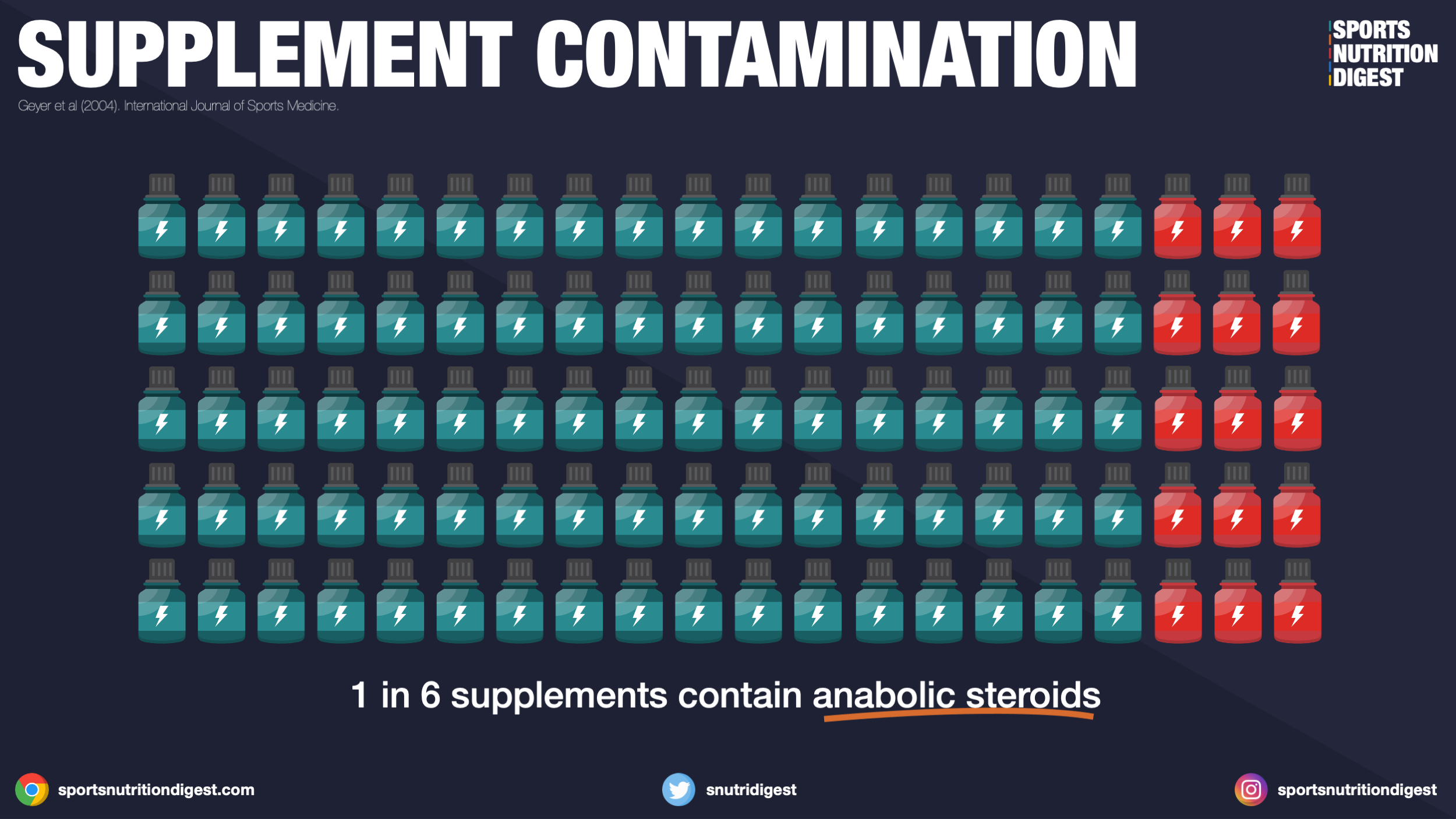
ANABOLIC STEROIDS IN SUPPLEMENTS
A study back in 2004 found that supplement contamination with anabolic steroids is frequent.
-

PROHIBITED SUBSTANCES IN SUPPLEMENTS
Supplements are often contaminated with prohibited substances.
-
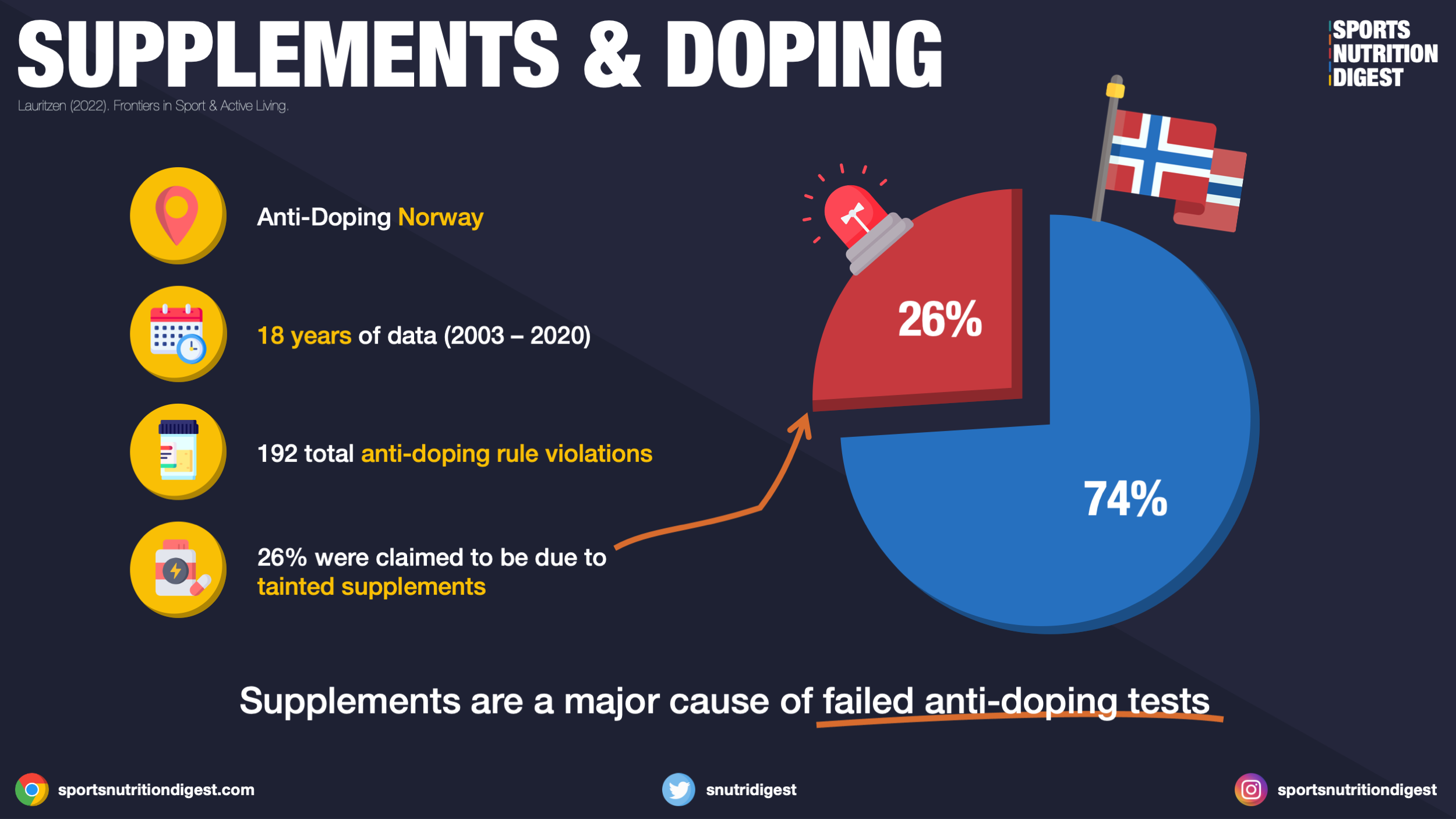
SUPPLEMENTS & DOPING TESTS
Many athletes use supplements, but there are significant risks regarding failed anti-doping tests.
-
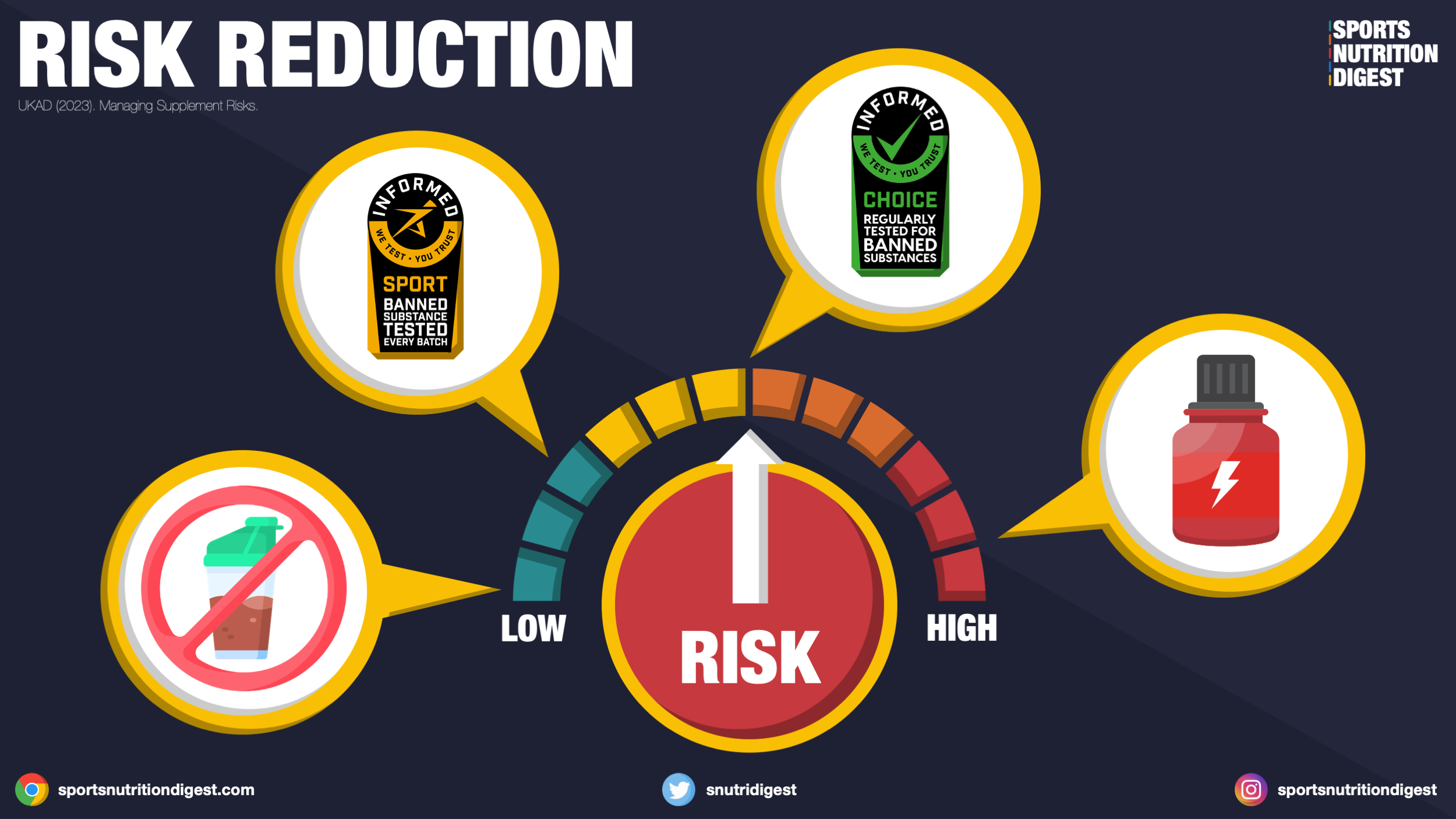
SUPPLEMENT RISK REDUCTION
What process should you choose to lower supplement risks.
-

BODY WATER BALANCE
How much water we naturally lose and gain throughout a day to maintain hydration balance.
-

SWEAT RATES IN SPORT
The highest measured sweat rates in various sports from research papers.
-

CONSEQUENCES OF DEHYDRATION
Hydration and staying hydrated is crucial, if you are dehydrated there are consequences.
-
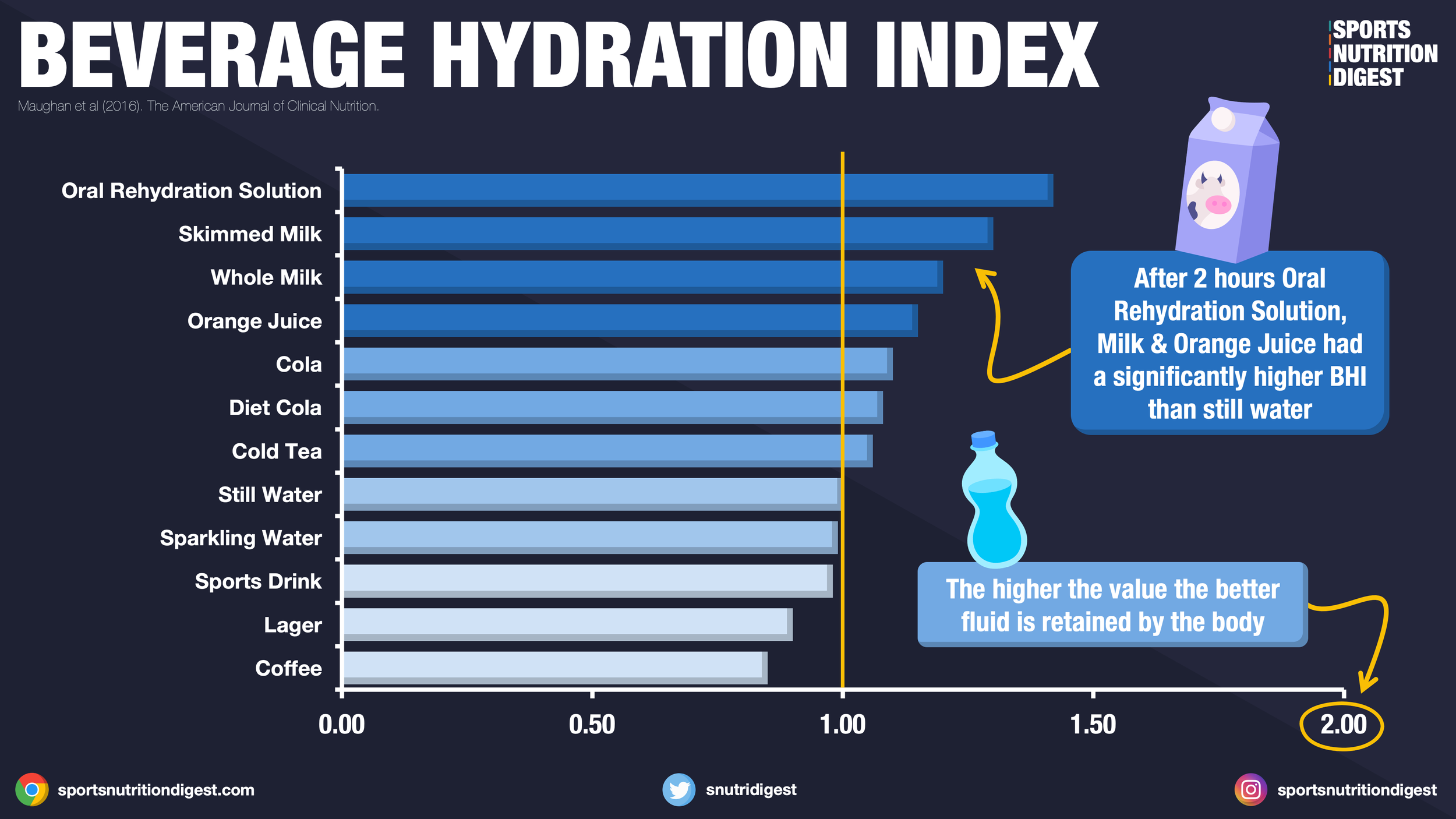
BEVERAGE HYDRATION INDEX
How beneficial for hydration status are specific drinks.
-
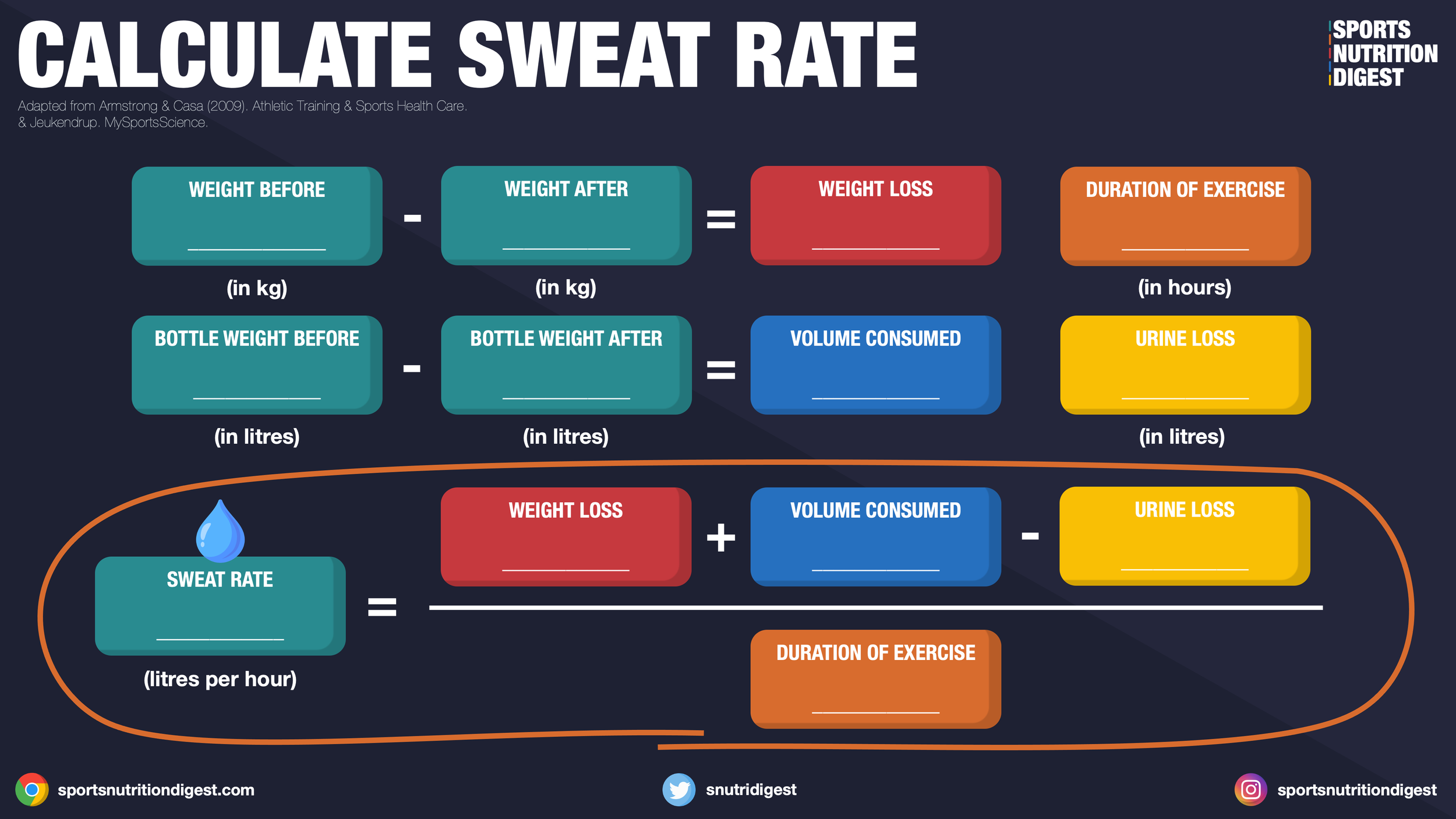
CALCULATE SWEAT RATE
Understanding sweat rate is key for maintaining hydration status during and post-exercise. This is how to calculate your sweat rate.
-

HOW NUTRITION AFFECTS US
Why nutrition need to be a focus of active individuals and athletes.
-

NUTRITION CHOICES ARE INVESTMENTS
Your daily nutrition choices and behaviour add up over time.
-

COMPOSITION OF BODY FLUIDS
Hydration impacts various areas of the body, which each have their own unique chemical composition (including electrolytes).
-

ATHLETE NUTRITION NEEDS
How athlete’s nutrition needs differ from the general population.
-
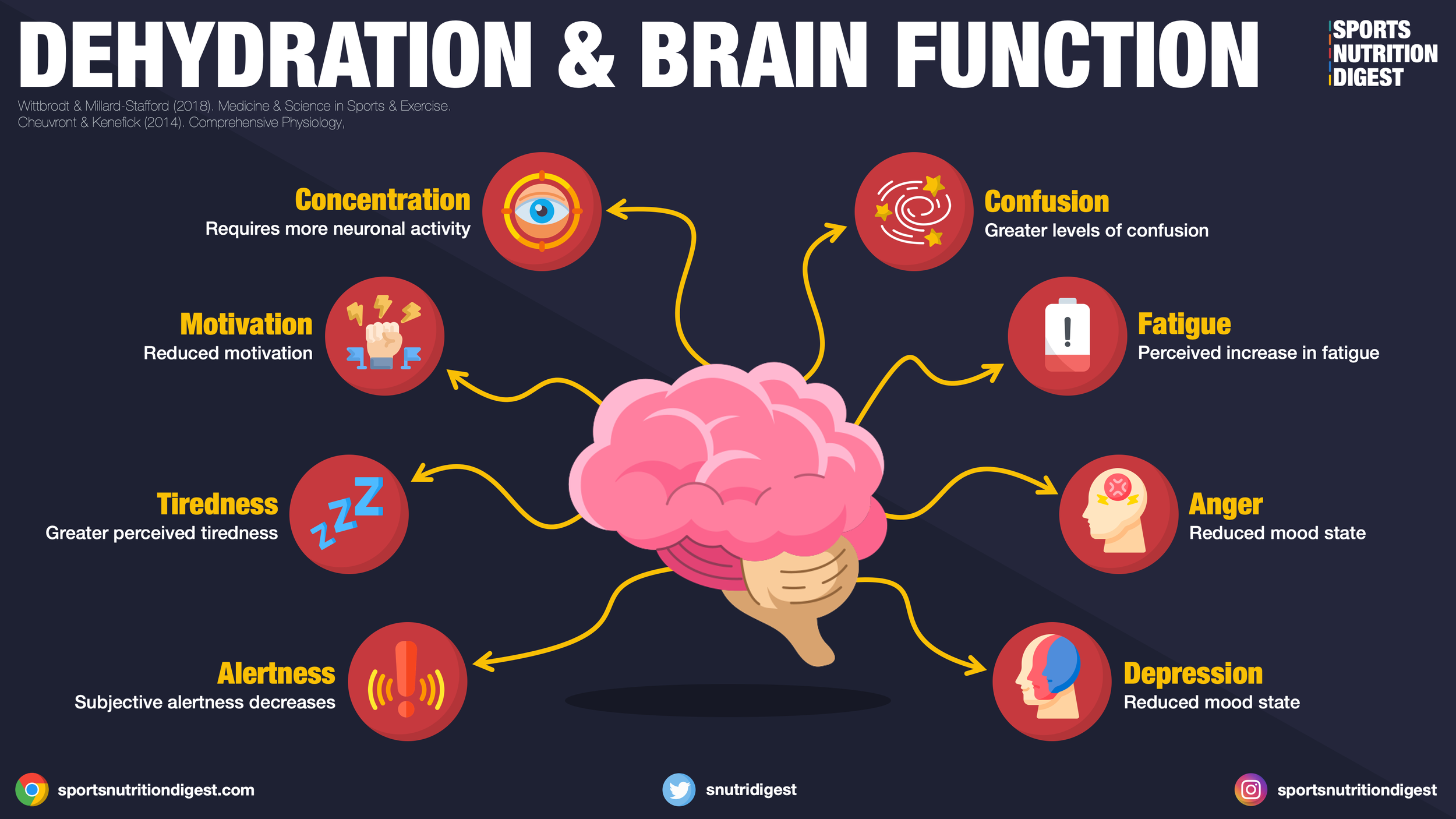
DEHYDRATION & BRAIN FUNCTION
Hydration status significantly impacts brain function and performance through various pathways.
-

DEHYDRATION & PERFORMANCE
Optimal performance is tied to various nutritional components, hydration is only one.
-

DEHYDRATION IN SPORT
Inadequate hydration is common across many sports.
-

DEHYDRATION RISK REDUCTION
Poor hydration status is common in sport, here is how to reduce the risk of dehydration.
-

DEHYDRATION RISKS IN SPORT
Depending on the nature of specific sports, the risk of dehydration can vary, here is a framework to assess hydration risks in sport.
-

ELECTROLYTE FOOD SOURCES
Electrolyte intake is key for maintaining adequate hydration status, here are various food sources of electrolytes.
-

ELECTROLYTE LOSSES
Electrolyte losses vary across age and sex leading to higher risk of poor hydration status in some groups than others.
-

FLUID LOSSES IN HEAT
Hot environments can exacerbate fluid losses which can significantly impair hydration status and performance.
-

FLUID TONICITY
Regarding hydration, the terms hypotonic, hypertonic and isotonic are common, but what do they mean.
-

HYDRATION ASSESSMENTS
There are various methods to assess hydration status, each with their own benefits and drawbacks.
-

HYDRATION GUIDELINES
How can you maintain adequate hydration status, before, during and after exercise.
-

HYDRATION STATUS
How do you categorise internal fluid balance and what are the terms associated with hydration in the body.
-

HYDRATION SUMMARY
A summary of how important hydration is for health and performance.
-
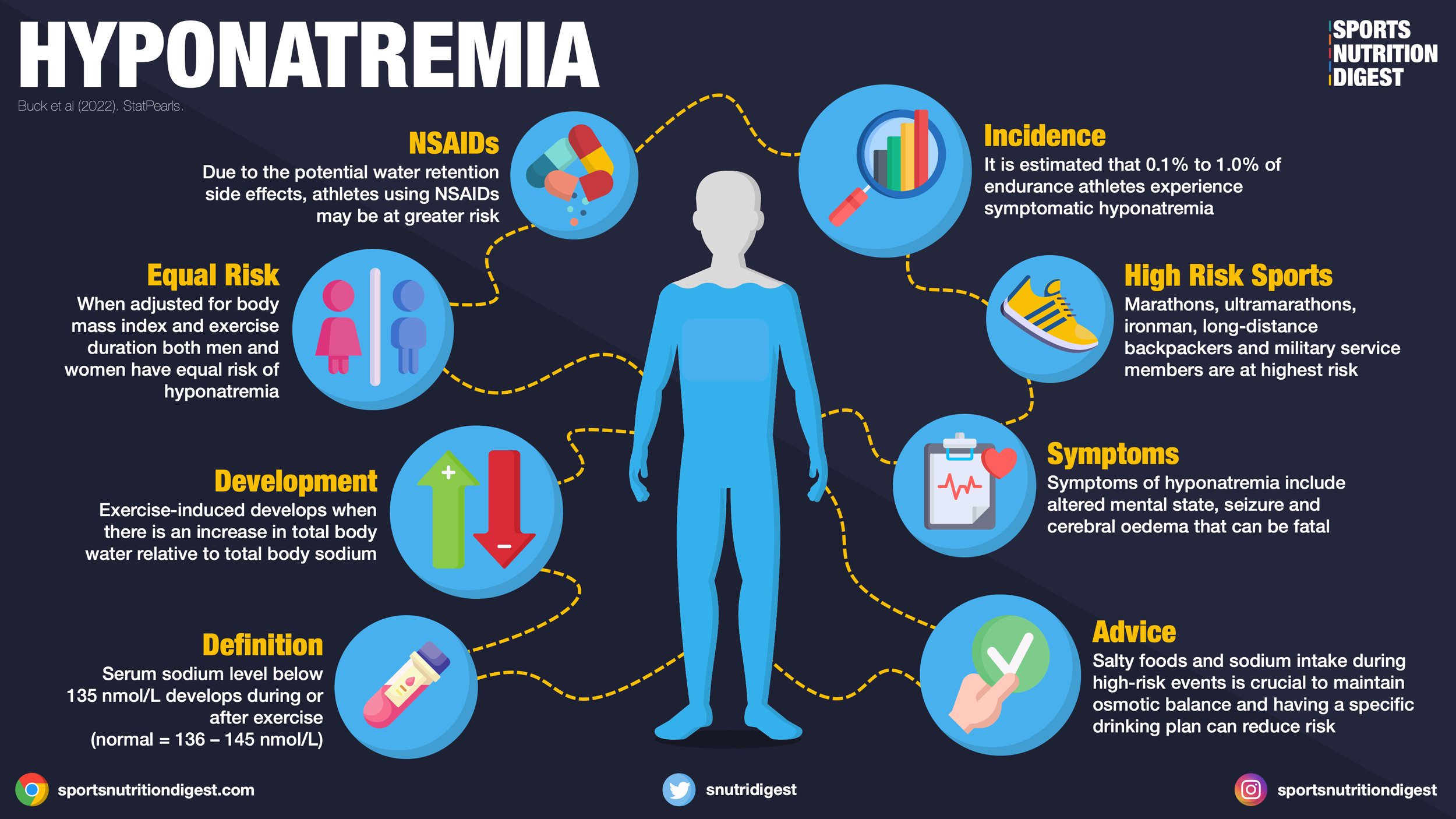
HYPONATREMIA
What happens when you drink too much water and dilute your bodies electrolytes. This is why a hydration plan is crucial.
-

INTENSITY & ELECTROLYTE LOSS
The intensity of exercise can impact electrolyte losses which in turn affects hydration status.
-

MAKE YOUR OWN SPORTS DRINK
Sports drinks are commonly available but making your own allows you to individualise their content to your specific needs.
-

PLANNED DRINKING VS THIRST
Both hydration strategies are useful, but depending on the nature of your training and goals, one may be better than the other.
-

RATE OF DRINKING
Drinking large amounts infrequently or small amounts more often significantly affects fluid balance and hydration status.
-

TRACK & FIELD DEHYDRATION RISKS
Hydration during training and competition is more important in some events than others.
-

URINE TESTING
Urine testing is a common method to assess hydration status, but is it accuracte?
-

NUTRITION PYRAMID OF IMPORTANCE
What areas should you prioritise first when building a diet.
-

YOUTH DEHYDRATION RISKS
Hydration could be more important for youth athletes than adults.
-

ACTIVE VS SEDENTARY GAINS
Physical activity has a significant impact on youth physical development and health outcomes.
-

ADOLESCENT DEVELOPMENT
During puberty adolescents go through a significant period of development that needs to be fuelled appropriately.
-

ADOLESCENT ENERGY NEEDS
During adolescence, youth athletes need a significant amount of calories.
-

BODY COMPOSITION & EDUCATION FRAMEWORK
How should body composition assessment and education be implemented from youth to adult athletes.
-

CALCIUM NEEDS FOR GROWTH
Adequate calcium intake is essential for growth in youth athletes.
-

CARBOHYDRATE SNACKS
Some of the best carbohydrate-based snacks to help fuel training and competition.
-

CONSEQUENCES OF LOW ENERGY AVAILABILITY
Not eating enough calories can have severe consequences in youth athletes.
-

DISORDERED EATING IN YOUTH ATHLETES
The pressures put on youth athletes can result in symptoms of disordered eating presenting themselves.
-

ENERGY NEEDS FOR GROWTH
How many calories do youth athletes need to fuel growth.
-

MAXIMAL FAT OXIDATION
The ability to use fat as a fuel source differs between sexes and through life.
-

PEAK LEAN MASS GAIN
During adolescence peak lean mass gain peaks to 3.8g per day.
-
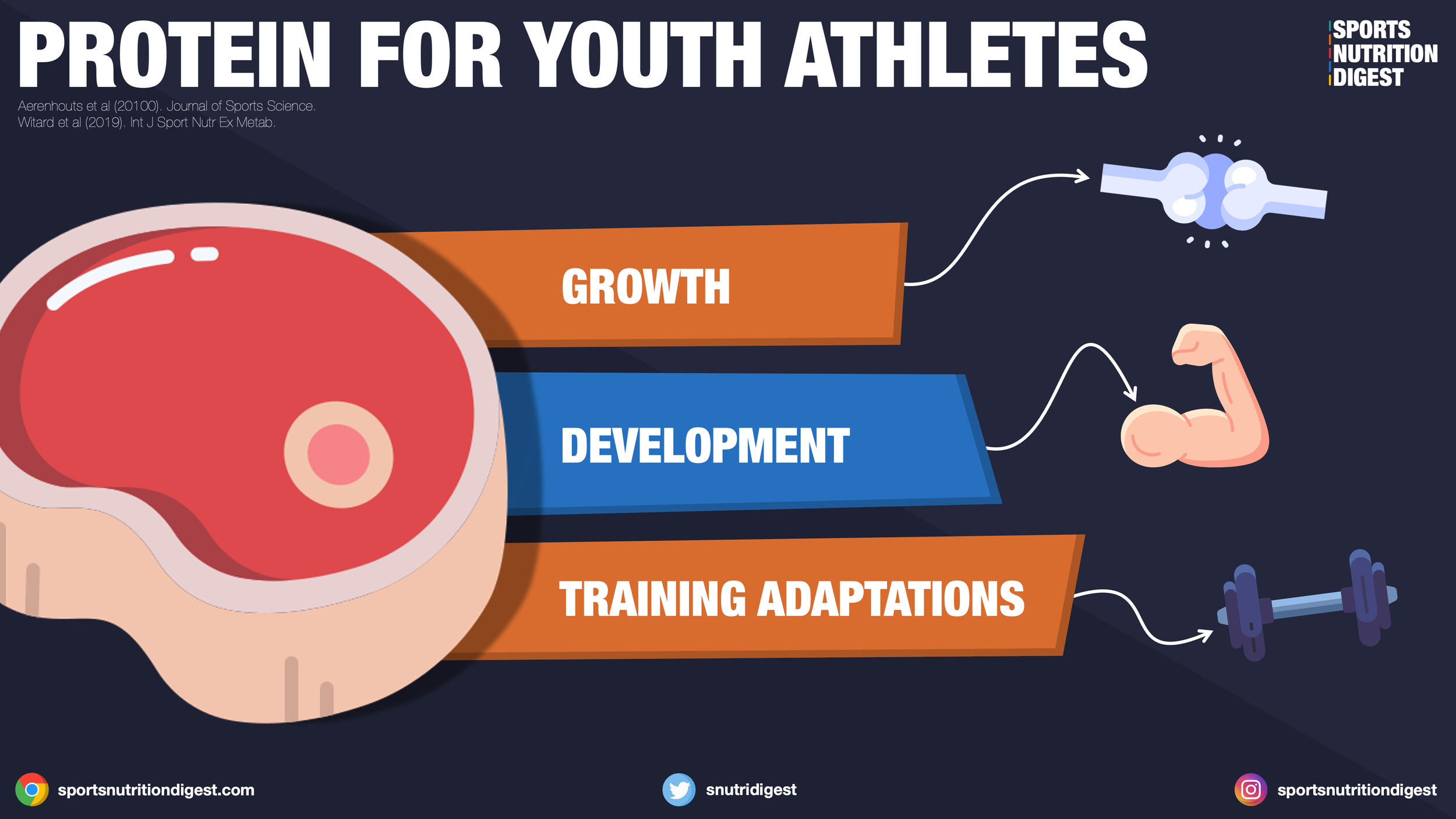
PROTEIN FOR YOUTH ATHLETES
Protein is essential to support natural lean mass gain, growth and training adaptations.
-

PROTEIN SNACKS
A selection of the best protein snacks to support muscle growth throughout the day.
-

SDA YOUTH ATHLETE POSITION STAND
Sports Dieticians Australia’s guidance on what should coaches and parents be aware of regarding nutrition for youth athletes.
-

VARIABILITY IN ENERGY NEEDS
Energy needs can vary hugely in youth athletes, primarily due to metabolism and hormones.
-

VITAMIN D
One of the most important vitamins and health and performance across numerous populations.
-

YOUTH FUELLING CONSIDERATIONS
The nature of youth sport can result in a significant fuelling burden on athletes.
-

YOUTH IRON DEFICIENCY
Iron status and needs can vary significantly during adolescence.
-

YOUTH NUTRITION SUMMARY
A summary of the most important messages regarding nutrition for youth athletes.
-

YOUTH PROTEIN NEEDS
How much protein do youth athletes need.
-

YOUTH RMR PREDICTION
These equations can help estimate resting metabolic rate for youth athletes.
-

ADOLESCENT SUPPLEMENT USE
What are the primary reasons why youth athletes use supplements.
-

ANTI-DOPING TESTING SENSITIVITY
Even microscopic contamination of supplements can lead to a failed anti-doping test.
-
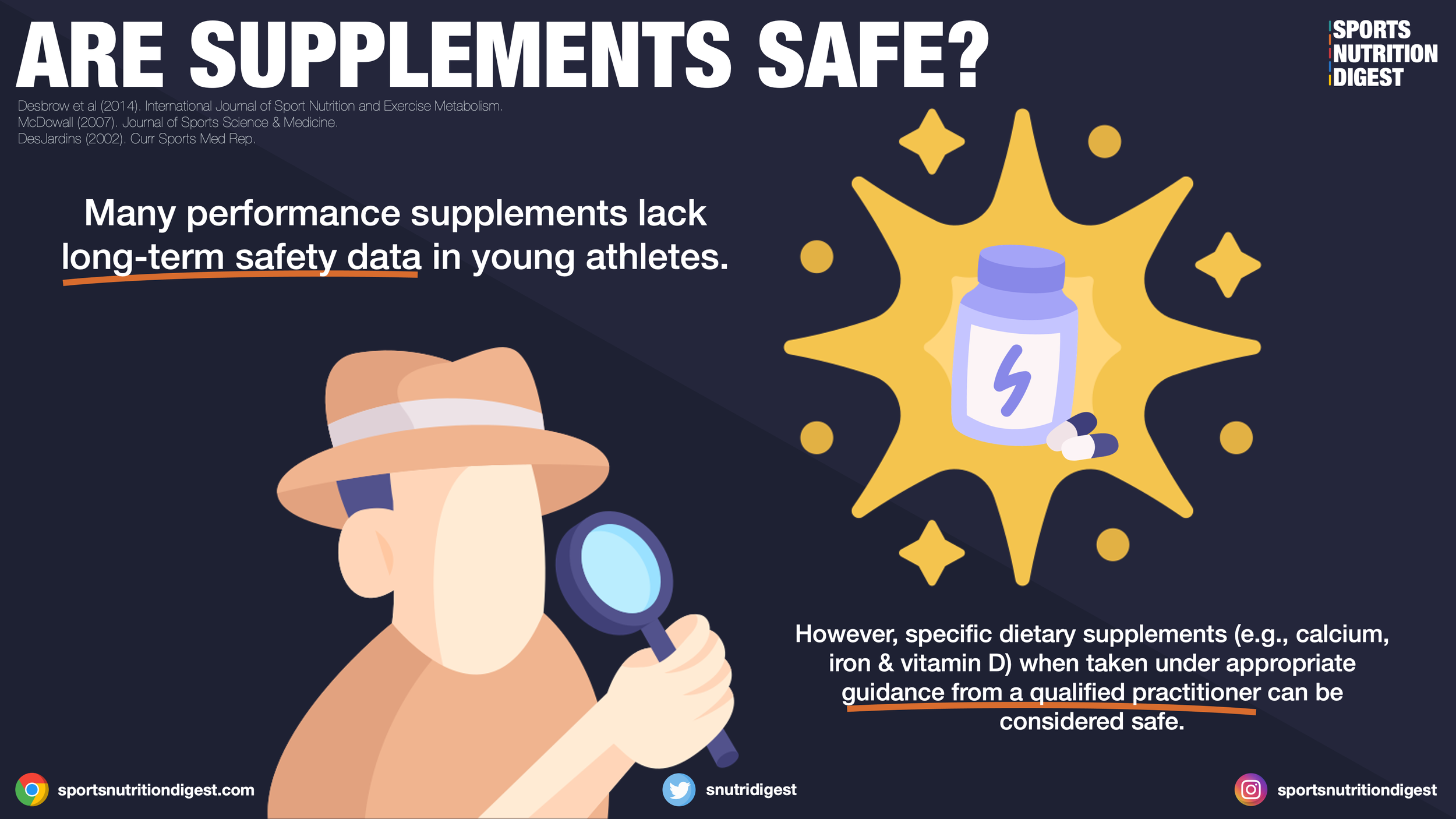
ARE SUPPLEMENTS SAFE?
Many supplements do not have adequate safety data, especially for youth athletes.
-
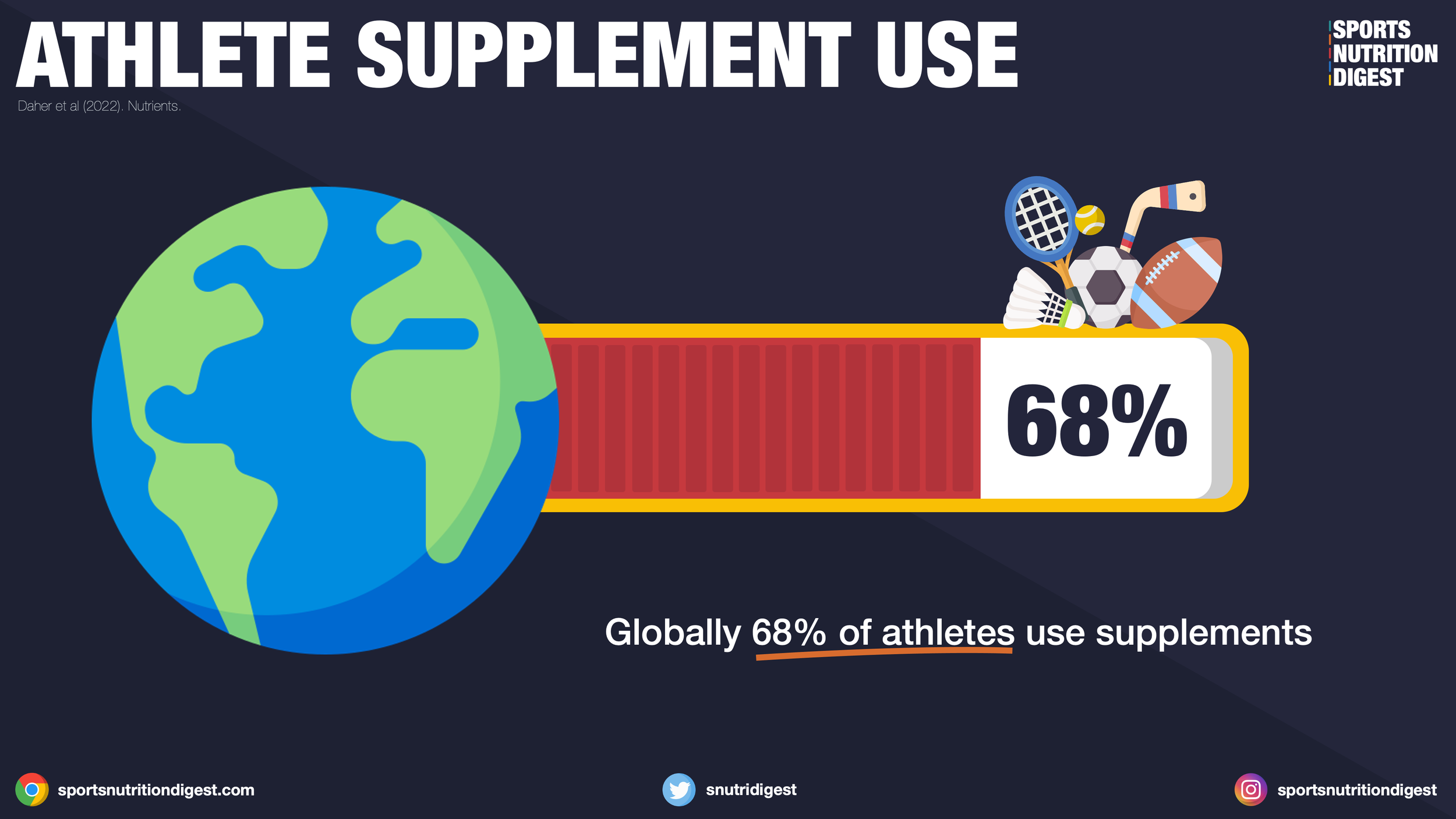
ATHLETE SUPPLEMENT USE
How popular are supplements amongst athletes globally.
-

BATCH-TESTING PROGRAMMES
Athletes should only use batch-tested supplements to avoid any safety issues.
-

CBD CONTAMINATION
CBD is currently a popular herbal supplement, however there are significant safety issues with its use.
-

CBD USE IN SPORT
Many rugby-union athletes use CBD, despite the current risks.
-

COMMON SUPPLEMENTS
What are the most common supplements used in athletic populations.
-

CONTAMINATION CASE STUDY 1
Jessica Hardy was a Team USA Olympic medal favourite, but she failed an anti-doping test due to a contaminated supplement.
-

CONTAMINATION CASE STUDY 2
CJ Ujah failed an in-competition anti-doping tests due a supplement he purchased online.
-

ENVIRONMENT RISK REDUCTION
Reducing risk of unsafe supplementation is not just the responsibility of the athlete.
-

EVIDENCE-BASED SUPPLEMENTS
Despite the many supplements available on the market, only a few have a solid evidence-base to support their use.
-

FOOD FIRST APPROACH
For every reason young athletes give for using supplements, there is a safe food first approach.
-

GLOBAL CONTAMINATION RISKS
Supplement contamination risks differ across the globe.
-

HERBAL PRODUCT RISKS
Herbal products are becoming increasingly popular, despite the risks associated with this category of supplement product.
-

HIGH RISK SUPPLEMENTS
Some supplements are higher risk than others, here are some signs to look out for.
-

HOW CONTAMINATION OCCURS
Supplement contamination is a serious issue, here is how it can happen.
-

INFORMED SPORT
Informed Sport is the gold standard for supplement batch-testing programmes, this is what they do.
-
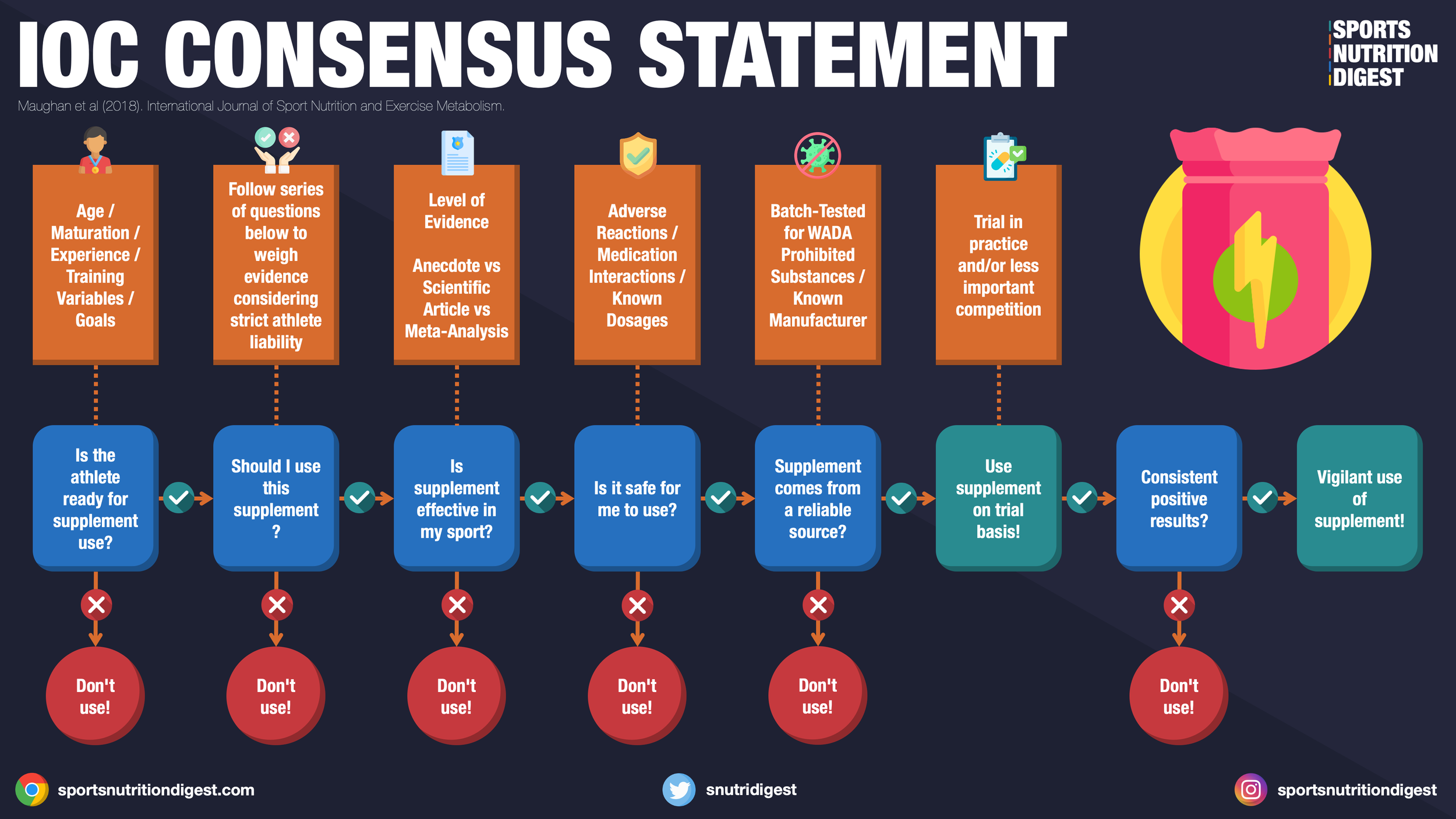
IOC SUPPLEMENT CONSENSUS STATEMENT
The International Olympic Committee have published their consensus statement on safe supplementation.
-

PROTEIN FORTIFIED FOODS
One of the biggest grey areas in performance nutrition is that or protein fortified foods, what are they and are they safe?
-
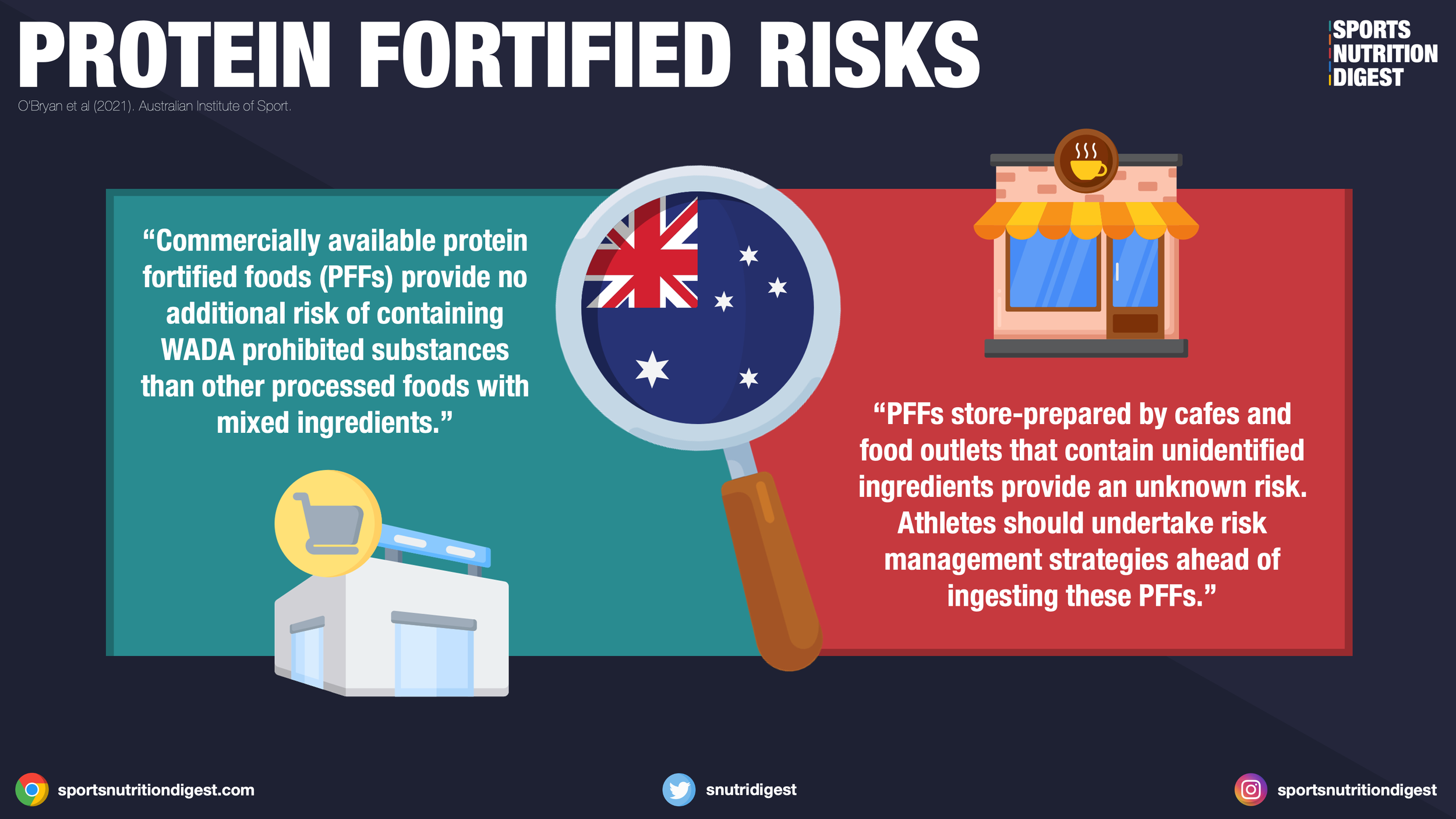
PROTEIN FORTIFIED RISKS
What are the risks associated with protein fortified or added-protein foods?
-
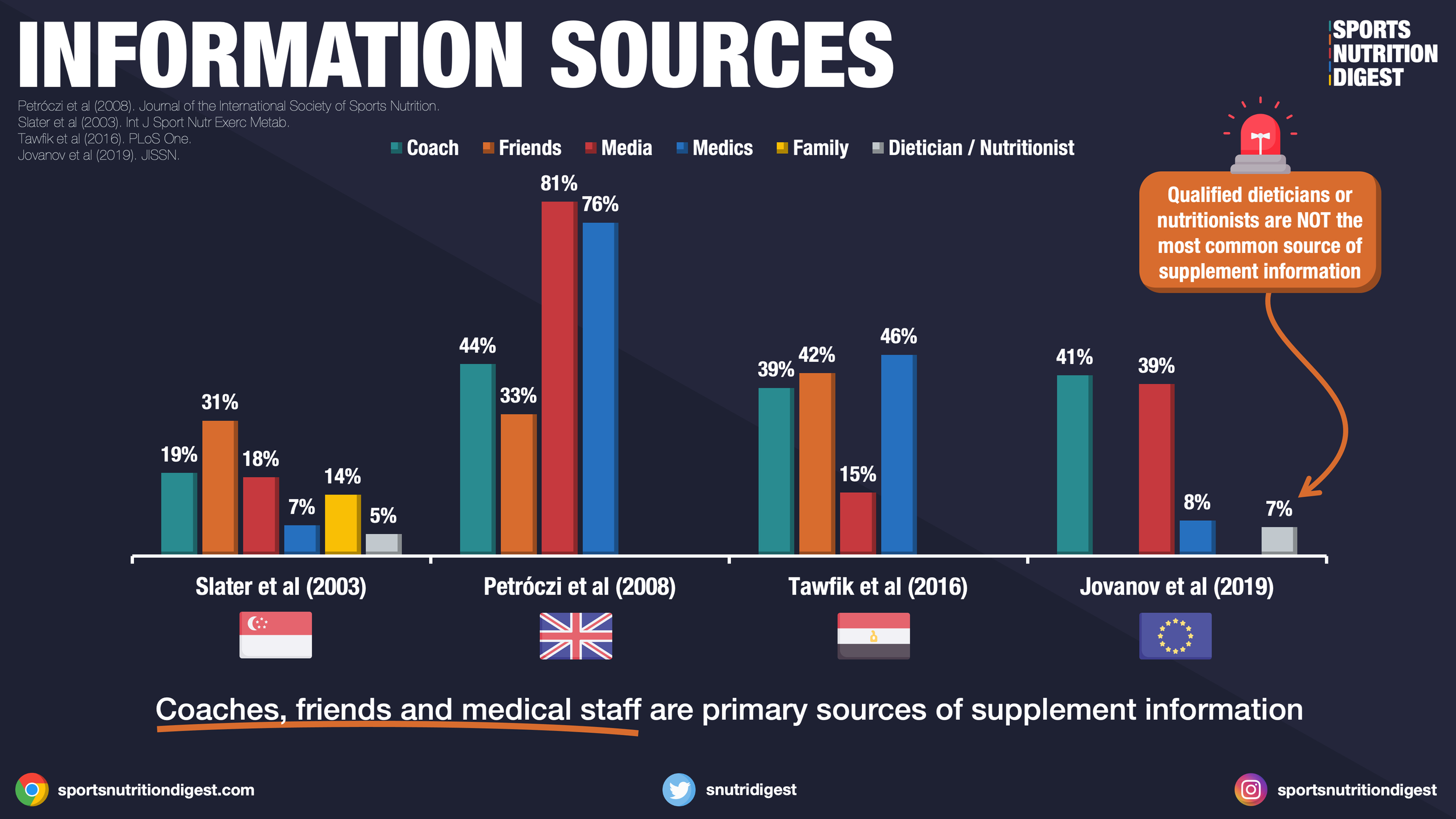
SUPPLEMENT INFORMATION SOURCES
Where do athletes get their information regarding supplements.
-

SUPPLEMENT KNOWLEDGE
Despite the popularity of supplements in athletic populations, the knowledge of these supplements is poor.
-
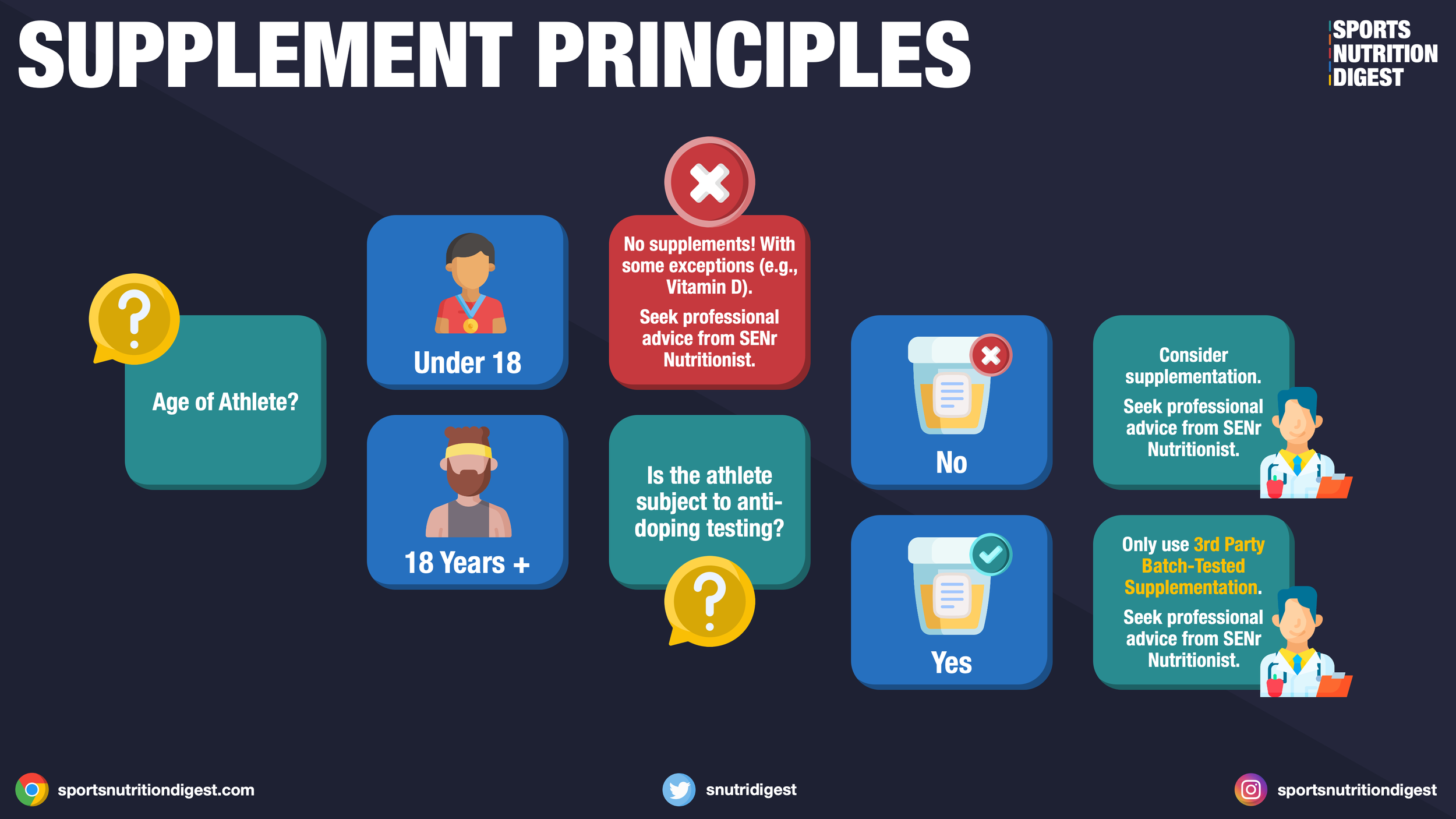
SUPPLEMENT PRINCIPLES
Here is the Sports Nutrition Digest supplement decision making tree.
-

SUPPLEMENT RISKS IN THE UFC
Supplement contamination and anti-doping risks is higher in some sports than others, notably in mixed martial arts.
-

SUPPLEMENT SAFETY SUMMARY
The key takeaway messages for supplements and supplement safety.
-

SUPPLEMENTS & DOPING
How much do supplements affect doping testing in different countries.
-

TAMPERING CASE STUDY
There have been incidences of athletes faking supplement contamination when they fail anti-doping tests.
-

WADA PROHIBITED LIST
What substances and methods can athletes fail anti-doping tests for.
-
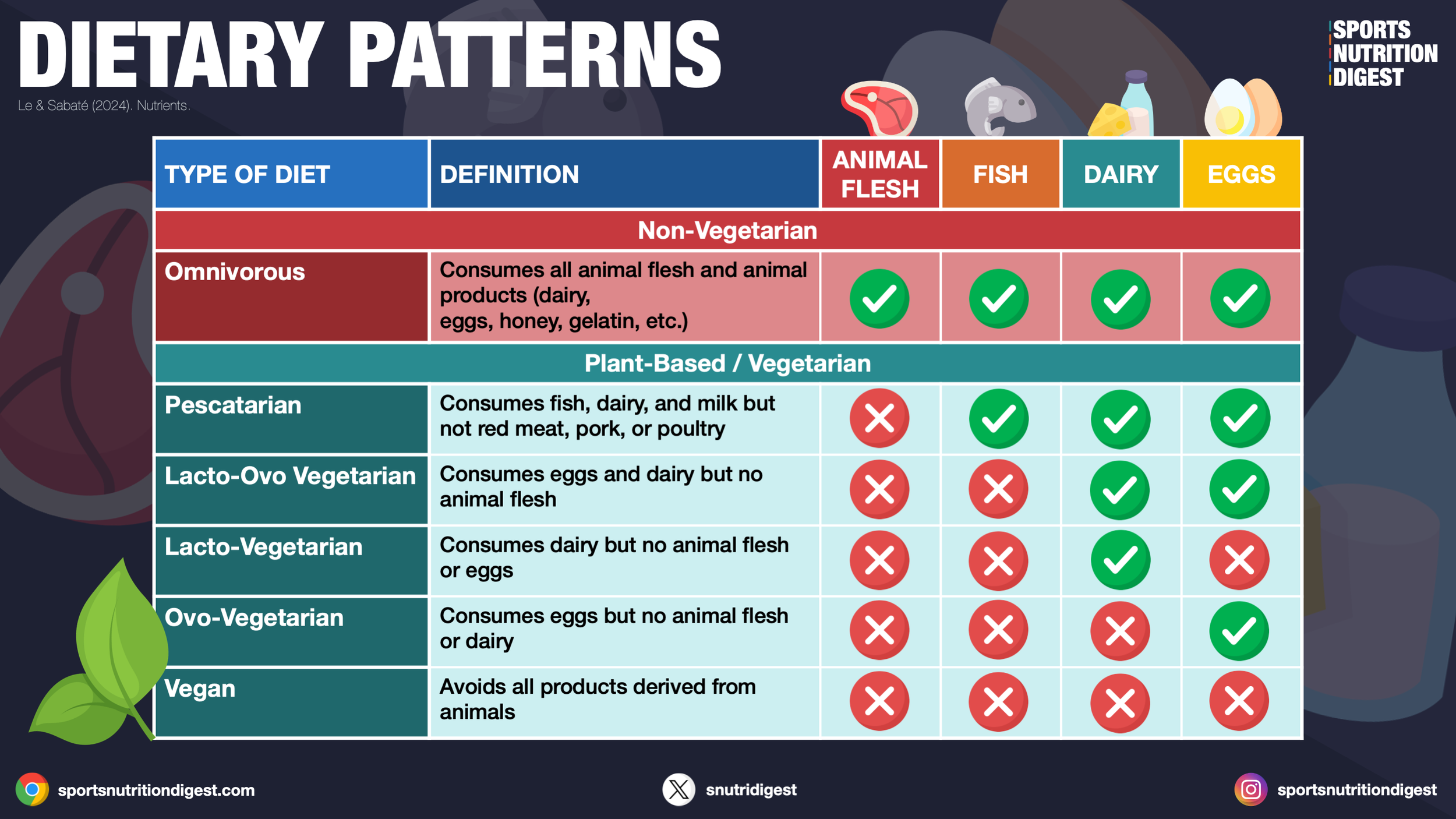
DIETARY PATTERNS
Omnivore to pescatarian to vegetarian to vegan, there are various dietary patterns than people follow.
-

ESSENTIAL AMINO ACIDS
The building blocks of protein.
-

KEY PLANT-BASED FOODS
Some of the best foods to eat for vegans and those following a plant-based diet.
-

LEUCINE CONTENT IN FOOD
Leucine is one of the most important amino acids for stimulating muscle protein synthesis, and it does change in animal and plant-based foods.
-

MYCOPROTEIN AMINO ACIDS
Mycoprotein is one of the best plant-based protein sources for vegans, here is the amino acid profile.
-

MYCOPROTEIN NUTRITION
Mycoprotein (Quorn) is one the best plant-based protein sources for vegans, here is the nutritional value.
-

OMNIVORE VS VEGAN DIET MACRONUTRIENTS
How do calorie and macronutrient intakes differ between omnivores and plant-based athletes following a vegan diet.
-

EXAMPLE OMNIVORE VS VEGAN DIET
How do meals and snacks differ between omnivores and plant-based diets.
-

PHYTATES
Plant-based diets can be high in phytates, but are they beneficial or detrimental for health?
-
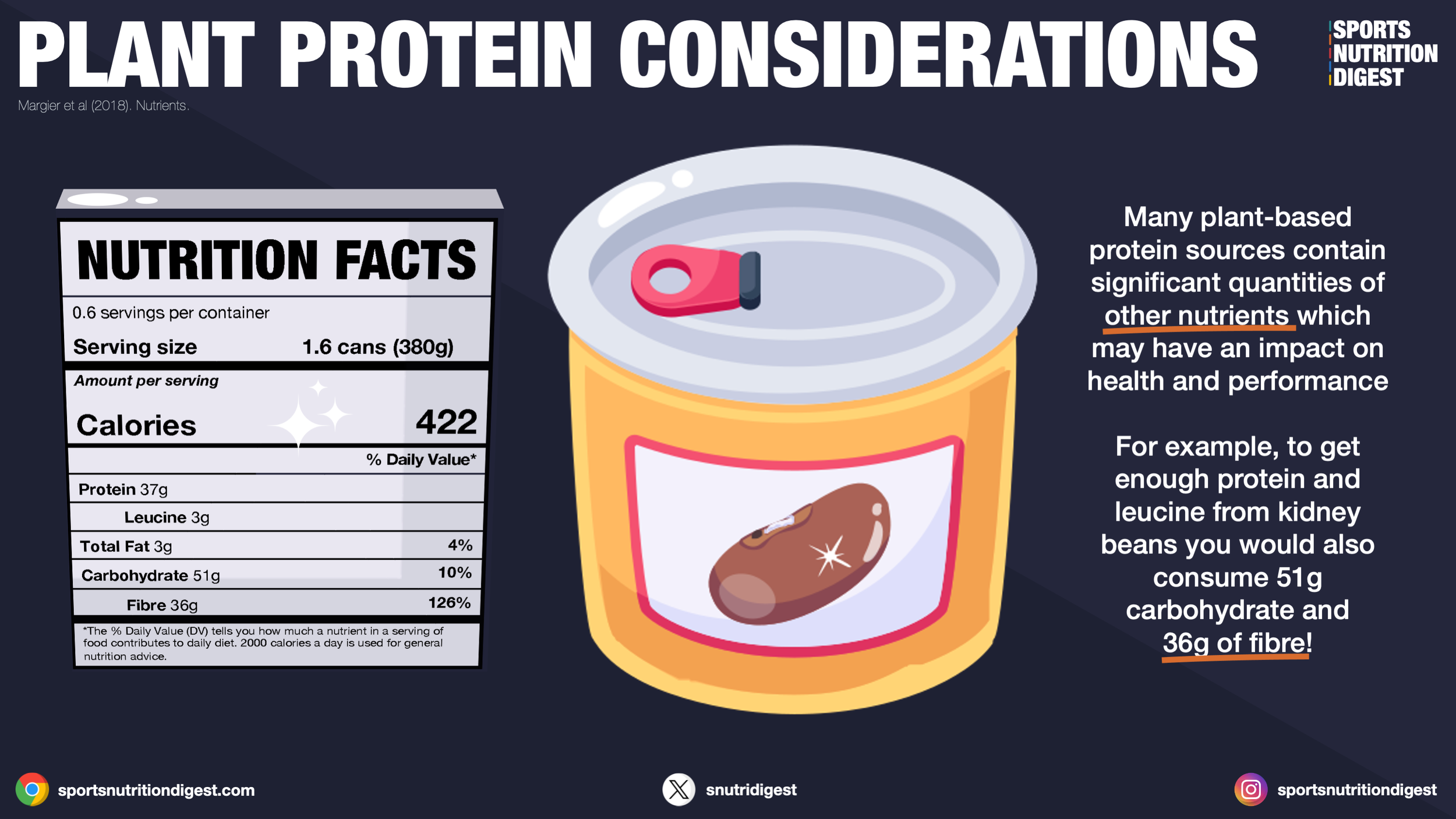
PLANT-PROTEIN CONSIDERATIONS
Plant-based protein sources have many benefits, but they do come with additional considerations for athletes.
-

PLANT PROTEIN SYNTHESIS
Plant-based protein sources have similar effects to animal-based sources, good news for vegan athletes.
-

PLANT-BASED BODY COMPOSITION
Vegan athletes tend to have lower body mass and be leaner than omnivorous athletes.
-
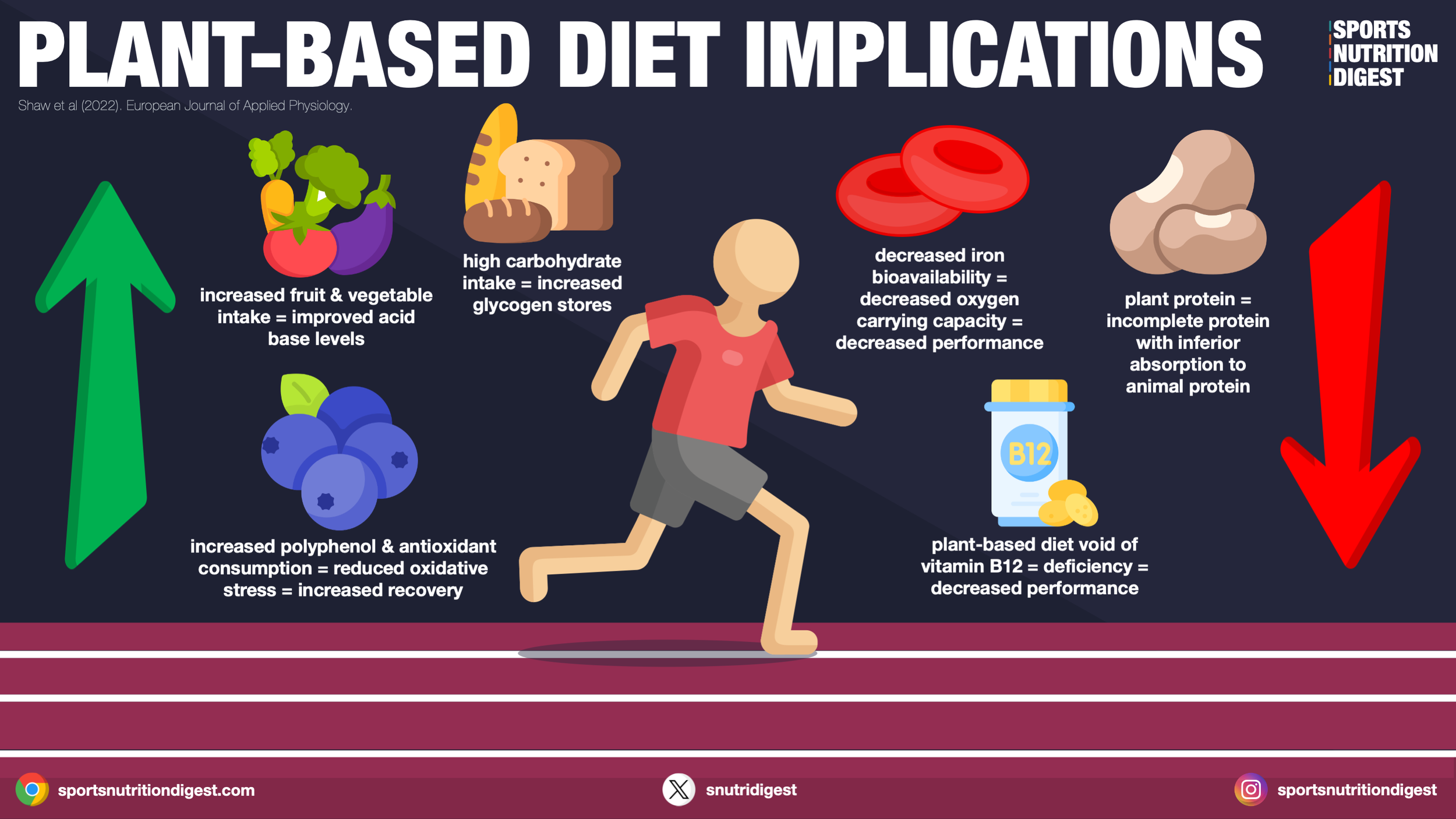
PLANT-BASED DIET IMPLICATIONS
Vegan athletes should be aware of these implications when following a plant-based diet.
-

PLANT-BASED HEALTH BENEFITS
Vegan athletes may experience various health benefits.
-

PLANT-BASED NUTRIENT ABSORPTION
Vegan diets may results in poorer nutrient absorption compare to those who eat animal products.
-

PROTEIN DIGESTIBILITY
How does digestibility compare between animal-based and plant-based proteins.
-

PROTEIN QUALITY
How does quality compare between animal-based and plant-based protein sources.
-

PROTEIN SOURCE EFFICIENCY
How efficient are plant-based and aminal-based protein sources.
-

TANNINS: FRIEND OR FOE?
Tannins have various health benefits, but they also have drawbacks.
-

VEGAN ATHLETE CONSIDERATIONS
For those athletes who follow a plant-based diet, there are various areas that require attention.
-

VEGAN MEAL MUSCLE PROTEIN SYNTHESIS
How do plant-based meals influence muscle protein synthesis.
-

VEGAN VS OMNIVOROUS DIETS
How does a plant-based diet stack up against an omnivorous diet for body composition and performance?


